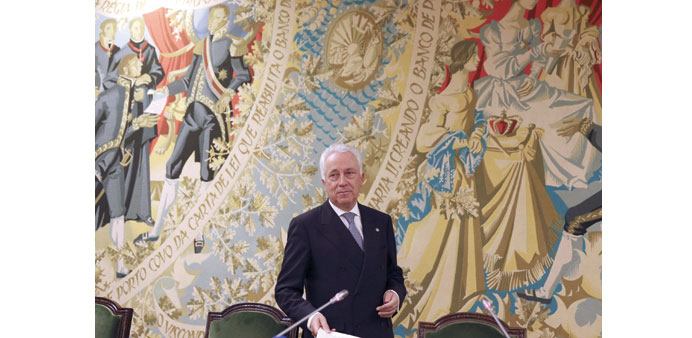The governor of the Bank of Portugal, Carlos Costa, arrives to present the solution found for the Espirito Santo bank, during a press conference held in the head office in Lisbon on Sunday. Under the rescue, a new entity Novo Banco will be given €4.9bn ($6.6bn) of capital, while Banco Espirito Santo (BES) is left holding its bad assets.
AFP
Portugal narrowly averted a national disaster and a fresh eurozone crisis yesterday by launching a new bank as part of a rescue of nearly €5.0bn for Banco Espirito Santo.
Wielding new EU rules to shield taxpayers and governments from near-bankrupt banks, Portugal and the EU moved fast to pre-empt a collapse of confidence when markets and banks opened for business.
The bank was in dire straits, after reporting a record loss last week on top of insolvence for its three holding companies amid allegations of accounting fraud.
Its share price plunged last week and trading was suspended.
The rescue, announced late on Sunday, immediately pushed down Portugal’s critically important borrowing rates on the eurozone debt market where the country has only just won back fragile credibility after exiting a three-year international aid programme.
The European Commission lost no time in clearing the rescue as meeting EU competition rules and said it would “restore confidence in financial stability” and avoid the risk of “systemic effects”.
The new head of the Commission, Jean-Claude Junker, said in Athens that the situation in Portugal remained “fragile,” adding that “we must remain vigilant... across Europe, we could be affected by things which we cannot predict”.
Banco Espirito Santo is the third-biggest bank in Portugal playing a role across the economy with big interests in insurance, property, tourism and the health sector.
The rescue helped push up prices on European stock markets where investors were worried about possible knock-on effects if the bank had crashed.
Portugal emerged from a three-year bailout by the International Monetary Fund and EU only in May, and was winning praise as a success story for reforms imposed by the eurozone in the midst of its debt crisis.
The calamity which brought BES down in the space of just two months put this new-found confidence in danger.
Under the rescue, a new entity Novo Banco will be given €4.9bn ($6.6bn) of capital, while Banco Espirito Santo (BES) is left holding its bad assets.
BES will be closed down, the Commission said, with shareholders and all second-line creditors carrying much of the cost.
Announcing the rescue late on Sunday, Portugal’s central bank governor Carlos Costa said that “nothing changes for the (bank’s) customers” because from Monday BES “will become Novo Banco, even if branches at first keep the old logos”. He said: “There was an urgent need to adopt a solution to guarantee the protection of deposits and assure the stability of the banking system.”
Natixis bank economist Alan Lemangnen said the spreading of risk under the rescue plan was “positive” for all sides. “There is a real sharing of the costs between shareholders and holders of subordinated debt on one hand, and the state which is drawing on part of its reserves to recapitalise the new bank,” he said.
The emergency rescue procedure is in line with new EU policies in the light of the eurozone debt crisis.
These are intended to prevent a failing bank from spreading crisis through the financial system, pushing up borrowing rates for governments and throwing the eurozone back into turmoil.
Last week Banco Espirito Santo reported a first-half loss of €3.57bn — the worst ever reported in Portugal.
The Portuguese state will provide €4.4bn of the rescue from funds under a national bailout programme from which the country emerged only in May.
Another €500mn will come from a Resolution Fund set up by Portugal’s banks as part of the conditions for the 2012 national bailout by the IMF, the EU and the European Central Bank (ECB).
This fund will control Novo Banco and will have to repay the state by selling the new bank. BES was brought down largely by suspected improper accounting practices in the Espirito Santo Group built around three holding companies.
French banking group Credit Agricole, a leading BES shareholder with a 14.6% stake, is to report results today, which may reveal the extent of the damage it has suffered.
Portugal’s borrowing costs edged down yesterday after the government announced a rescue package worth nearly €5.0bn for troubled Banco Espirito Santo, the country’s largest private bank.
BES is in difficulty largely because of problems, and suspected improper accounting practices, in the accounts of the Espirito Santo Group of companies built around three holding companies which are under administration procedures.
The crisis raised concerns that the collapse of the bank — which has interests throughout the economy — could shake confidence in the Portuguese financial system.

